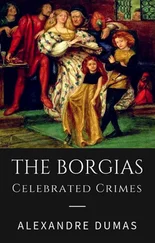There Burchard left it and upon his return he was appalled to see the dead pope’s face ‘had changed to the colour of the blackest cloth, and covered in blue-black spots; the nose was swollen, the mouth distended, the tongue bent back double, the lips seemed to fill everything and the appearance of the face was more horrifying than anything ever seen.’ Francesco Gonzaga confirmed this in a letter to his wife, Isabella d’Este; the corpse ‘had lost all human form,’ he wrote, adding that ‘everyone refused to touch it though eventually one of the porters dragged it to the grave by means of a rope attached to one of the feet.’
The six porters made gruesome jokes about its appearance as they struggled to get the swollen corpse into a coffin that was much too small. ‘The carpenters,’ according to Burchard, ‘had made the coffin too narrow and too short and so they had to remove the mitre from the Pope’s head and place it by his side, before rolling up his body in an old carpet, and pummelling and pushing it into the coffin with their fists.’ Burchard added, sadly, that ‘no wax tapers or candles were used and no priests nor any other persons attended the body.’
The next day gruesome stories were spread about the city: The dead pope had been heard in conversation with Satan; he had bought the papacy for the price of his soul; he had struck a bargain with the devil and had agreed to wear the papal crown for eleven years and had done so for that period of time plus seven days. At the end, so it was rumoured, water had boiled in his mouth, causing steam to fill the room in which he died, and that, in the words of a macabre jest, when rigor mortis set in, ‘in death as in life, he remained erect.’ It was at least certain that, in the terrible heat of that August, the skin of the corpse had turned black and the smell that emanated from it was intolerable.
Inevitably there were rumours that the death was not a natural one, that the wine he and Cesare had drunk so thirstily on their arrival at Cardinal Castellesi’s country house had been poisoned. Many claimed that Cesare and his father had planned to kill the cardinal for his great riches, but that the servant who had been bribed to poison the wine served at the meal had poured the deadly concoction into the wrong flagons. This report spread far and wide, irrespective of the fact that none of the guests, who had drunk the same wine, displayed any ill effects until a week later.
Lucrezia was at the villa of Medelana when Cardinal Ippolito rode over from Ferrara to bring her the sad news; and on hearing the dreaded words, she afterward said that her ‘only wish was to die herself.’ Few were so moved. Machiavelli recorded, in verse, how ‘the soul of Alexander was brought to rest, glorious among the blessed,’ and following in ‘the Pope’s saintly footsteps came his three servants and beloved handmaidens, extravagance, simony and cruelty.’
Duke Ercole also had few regrets. In a letter to his ambassador in Milan, which he was confident would be passed on by the French governor of the city to Louis XII, he wrote:
Knowing that many will ask you how we are affected by the Pope’s death, we wish to inform you that it was in no way displeasing to us… There never was a Pope from whom we received fewer favours… even after concluding an alliance with him. In fact, it was only with the greatest difficulty that we obtained from him what he had promised us, for which we hold the Duke of Romagna responsible. He was never frank with us, never telling us of his plans, though we always told him of ours.
He also hoped for better things from Alexander VI’s successor, piously observing that ‘for the sake of Christendom he had often desired that divine goodness and providence would provide a virtuous and exemplary shepherd and that all scandal would be removed from the Church.’
‘HE COULD NOT HAVE FORESEEN THAT, AT THE TIME OF HIS FATHER’S DEATH, HE SHOULD HIMSELF HAVE BEEN SO SERIOUSLY ILL’
THE SEDE VACANTE , the period of the ‘empty throne’ between the death of one pope and the election of his successor, was often a tense and troubled time in Rome, and it was particularly so in the summer of 1503. On the morning of August 19, the day after Alexander VI died, all those cardinals who were in Rome, sixteen in all, assembled in the chapter house of Santa Maria sopra Minerva: ‘The great seal of Alexander VI was broken in their presence,’ the symbolic act whereby the college of cardinals formally assumed responsibility for the government of the church and of the city of Rome until such a time when the new pope would be elected. Although the first part of their task proved relatively straightforward, the second was fraught with difficulty and danger.
Rome was in an uproar. On August 24 the Orsini arrived in the city with twelve hundred armed men ‘and immediately started sacking and destroying the houses of Spaniards,’ according to a report made to the Venetian Senate; ‘there were weapons everywhere.’ The bulletins from the Vatican suggested that the commander of the papal army was close to death: ‘The Duke is more feverish than ever,’ Giustinian wrote of Cesare that day; and there was ‘hope in Rome that he will shortly follow his father to the grave.’ Certainly his enemies were eagerly awaiting this piece of news. While Cesare’s men, under the capable leadership of Miguel de Corella, had taken hold of the Borgo — the area around the Vatican and Castel Sant’Angelo — the rest of the city was out of their control.
Much of the city was in the hands of supporters of the rival Orsini and Colonna families, united for once in their hatred of the Borgias, taking what advantage they could of the pope’s demise. As the rumours of Cesare’s worsening condition spread rapidly through Rome, gangs of men marched threateningly through the streets, shouting, as they would never have dared to do while Alexander VI was still alive, ‘Down with the odious Catalan.’
The tension in the city intensified, moreover, when it became known that three armies were approaching Rome. The French troops, led by Francesco Gonzaga, Marquis of Mantua, were on their way south to defend Naples and had reached Viterbo, just forty miles north of the city walls; a force of Spaniards under Gonsalvo di Córdoba was marching north from Naples; and Cesare’s own battalions, poised for the start of what was to have been his Tuscan campaign, were now recalled from their camp near Perugia to march back down the Via Flaminia.
Louis XII of France and Ferdinand and Isabella of Spain were hoping to profit from Cesare’s incapacity; all of them — Cesare, perhaps, most of all — were intent upon using armed force to influence the forthcoming conclave in order to ensure that the new pope to be elected was a man sympathetic to their interests.
Cesare himself was still too ill to take personal control of the situation, unable to seize the advantage to establish his control of Rome or to defend his authority in his duchy. ‘He told me himself,’ Machiavelli wrote, ‘that he had foreseen every difficulty that could arise on the death of his father and had prepared adequate remedies; but he could not have foreseen that, at the time of his father’s death, he should himself have been so seriously ill.’ Those whose lands had been dispossessed used the opportunity offered by Cesare’s incapacity to take them back again. Italy was in an uproar, as his empire began to fall apart: Guidobaldo da Montefeltro returned to power in Urbino; Gianpaolo Baglioni came back to Perugia; the Varano family to Camerino; Giovanni Sforza to Pesaro; and the Orsini retook possession of their castles.
Yet Cesare’s position was not as weak as his enemies hoped. He still controlled the Borgo; he had at his command a well-trained army and also the money needed to pay its men; most of the cities of the Romagna remained firmly loyal, and he would have considerable influence in the imminent conclave. According to Giustinian’s reckoning, there were ‘eight cardinals who would follow him in everything,’ and several more besides. But he also had inveterate and influential enemies in the college, too, notably Ascanio Sforza and the cousins Raffaello Riario and Giuliano della Rovere, the latter of whom was on his way to Rome with an escort of one hundred crossbowmen in case of attack by Cesare’s men, who had been ordered to intercept him.
Читать дальше











